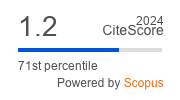Psycholinguistic and Didactic Principles of Forming Psychologists’Readiness for Linguistic Professional Activity
Keywords:
psyholinguistic and didactic principles, professional speech activity, intercourse, communication, professionally oriented speech, professional speech operations and actions.Abstract
Psycholinguistic and didactic principles of training future psychologists to professional speech activity as the main “weapon” of their chosen profession have been anayzed in the paper. Among them are such principles as: socio-linguocultural determination, ensuring holistic development of lexico-grammatical structure of a professionally-oriented speech; advancing development of linguistic competence in establishing of vocational and language activities; complementary language development for profession and professional speech activity: relying on well-established models of professional language and act heuristicity; formation of the image of profession or perception and mnemonic; cognitive conditioning of professional communication; creative organization (formation) of professional verbal communication; an algorithmic implementation of the act of socially oriented professional speech communication; development of internal speech programming; activation of mechanisms of professional communicative language activities; ensuring the conformity of professional speech activity. These principles are the rules of the university teacher’s educational work aimed at shaping of professional speech operations and actions that provide purposeful, professionally caused communication.
References
- Velichkovskiy, B. (2006). Kognitivnaya Nauka: Osnovy Psikhologii Poznaniya [Cognitive
Science: Fundamentals of Psychology of Cognition]. Vol. 1-2. Moscow: Smysl. - Vygotsky, L. (2000). Mysl’ i slovo [Thought and word]. Psikhologiya. 462−512.
- Davydov, V. (1986). Problemy Razvivayushhego Obucheniya: Opyt Teoreticheskogo i
Eksperimental’nogo Psikhologicheskogo Issledovanija [Problems of Developmental Learning:
Experience of Theoretic and Experimental Psychological Research]. Moscow: Pedagogika. - Ilyenkov, E. (1991). Filosifiya i Kultura [Philosophy and Culture]. Moscow: Politizdat.
- Rumyantseva, I. (2004). Psihologija Rechi i Lingvopedagogicheskaya Psikhologija [Psychology
of Speech and Lingvopedagogic Psychology]. Moscow: PER SE; Logos. - Fedorenko, L. (1984). Zakonomernosti Usvoeniya Rodnoy Rechi [Laws of Native Language
Acquisition]. Moscow: Prosveshcheniye.







 Creative Commons «Attribution» 4.0
Creative Commons «Attribution» 4.0